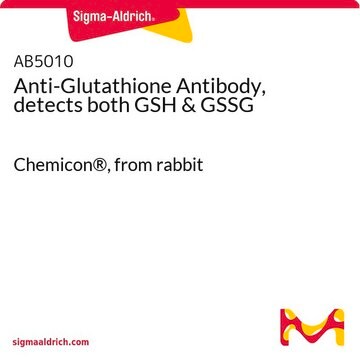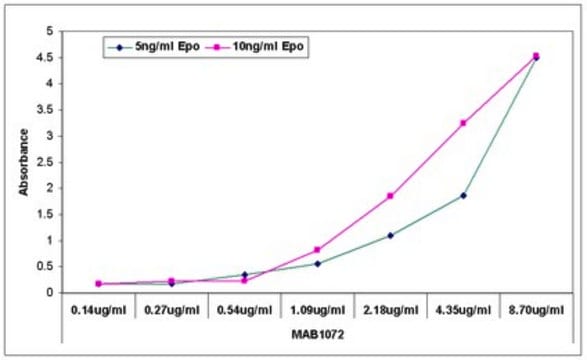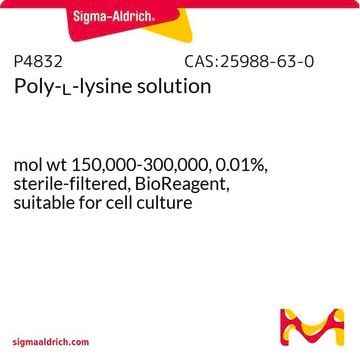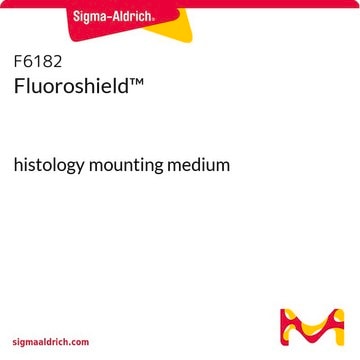MAB5310
Anti-Glutathione Antibody, clone D8
clone D8, Chemicon®, from mouse
Sign Into View Organizational & Contract Pricing
All Photos(1)
About This Item
UNSPSC Code:
12352203
eCl@ss:
32160702
NACRES:
NA.41
Recommended Products
biological source
mouse
Quality Level
antibody form
affinity purified immunoglobulin
antibody product type
primary antibodies
clone
D8, monoclonal
species reactivity
eukaryotes
manufacturer/tradename
Chemicon®
technique(s)
western blot: suitable
isotype
IgG2a
shipped in
dry ice
target post-translational modification
unmodified
Specificity
Reacts with reduced or non-reduced glutathione on proteins only. Does not react with free glutathione.
Immunogen
Glutathione-protein complexes.
Application
Anti-Glutathione Antibody, clone D8 is an antibody against Glutathione for use in WB.
Research Category
Neuroscience
Neuroscience
Research Sub Category
Oxidative Stress
Oxidative Stress
Western blotting of glutatione conjugated proteins under non-reduced conditions: 1:500-1:1000; does not react with glutatione by itself.
Immunocytochemistry: 1:500-1:1000 (Non-reducing conditions)
Optimal working dilutions must be determined by end user.
Immunocytochemistry: 1:500-1:1000 (Non-reducing conditions)
Optimal working dilutions must be determined by end user.
Physical form
Format: Purified
Immunoglobulin purified by protein A affinity and presented as a liquid in PBS, pH 7.2 with 0.01% sodium azide.
Storage and Stability
Maintain at 2-8°C in undiluted aliquots for up to 6 months from date of receipt.
Legal Information
CHEMICON is a registered trademark of Merck KGaA, Darmstadt, Germany
Disclaimer
Unless otherwise stated in our catalog or other company documentation accompanying the product(s), our products are intended for research use only and are not to be used for any other purpose, which includes but is not limited to, unauthorized commercial uses, in vitro diagnostic uses, ex vivo or in vivo therapeutic uses or any type of consumption or application to humans or animals.
Not finding the right product?
Try our Product Selector Tool.
Storage Class Code
12 - Non Combustible Liquids
WGK
WGK 2
Flash Point(F)
Not applicable
Flash Point(C)
Not applicable
Certificates of Analysis (COA)
Search for Certificates of Analysis (COA) by entering the products Lot/Batch Number. Lot and Batch Numbers can be found on a product’s label following the words ‘Lot’ or ‘Batch’.
Already Own This Product?
Find documentation for the products that you have recently purchased in the Document Library.
Omid Azimzadeh et al.
Cancers, 15(13) (2023-07-14)
Recent epidemiologic studies support an association between chronic low-dose radiation exposure and the development of cardiovascular disease (CVD). The molecular mechanisms underlying the adverse effect of chronic low dose exposure are not fully understood. To address this issue, we have
Yugo Tsuchiya et al.
The Biochemical journal, 474(14), 2489-2508 (2017-03-28)
Coenzyme A (CoA) is an obligatory cofactor in all branches of life. CoA and its derivatives are involved in major metabolic pathways, allosteric interactions and the regulation of gene expression. Abnormal biosynthesis and homeostasis of CoA and its derivatives have
Vladimir A Mitkevich et al.
Oxidative medicine and cellular longevity, 2016, 9092328-9092328 (2016-05-31)
Many viruses induce oxidative stress and cause S-glutathionylation of Cys residues of the host and viral proteins. Changes in cell functioning during viral infection may be associated with glutathionylation of a number of key proteins including Na,K-ATPase which creates a
Glutathione S-transferases interact with AMP-activated protein kinase: evidence for S-glutathionylation and activation in vitro.
Klaus, A; Zorman, S; Berthier, A; Polge, C; Ramirez, S; Michelland, S; Seve, M; Vertommen et al.
Testing null
Vladimir Alexandrovich Mitkevich et al.
Frontiers in pharmacology, 10, 922-922 (2019-09-03)
Exogenous RNases are selectively toxic to tumor cells. The reasons for this selectivity are not quite clear and should be searched for in the properties that distinguish malignant from normal cells. During onco-transformation, cells acquire properties allowing them to adapt
Our team of scientists has experience in all areas of research including Life Science, Material Science, Chemical Synthesis, Chromatography, Analytical and many others.
Contact Technical Service








